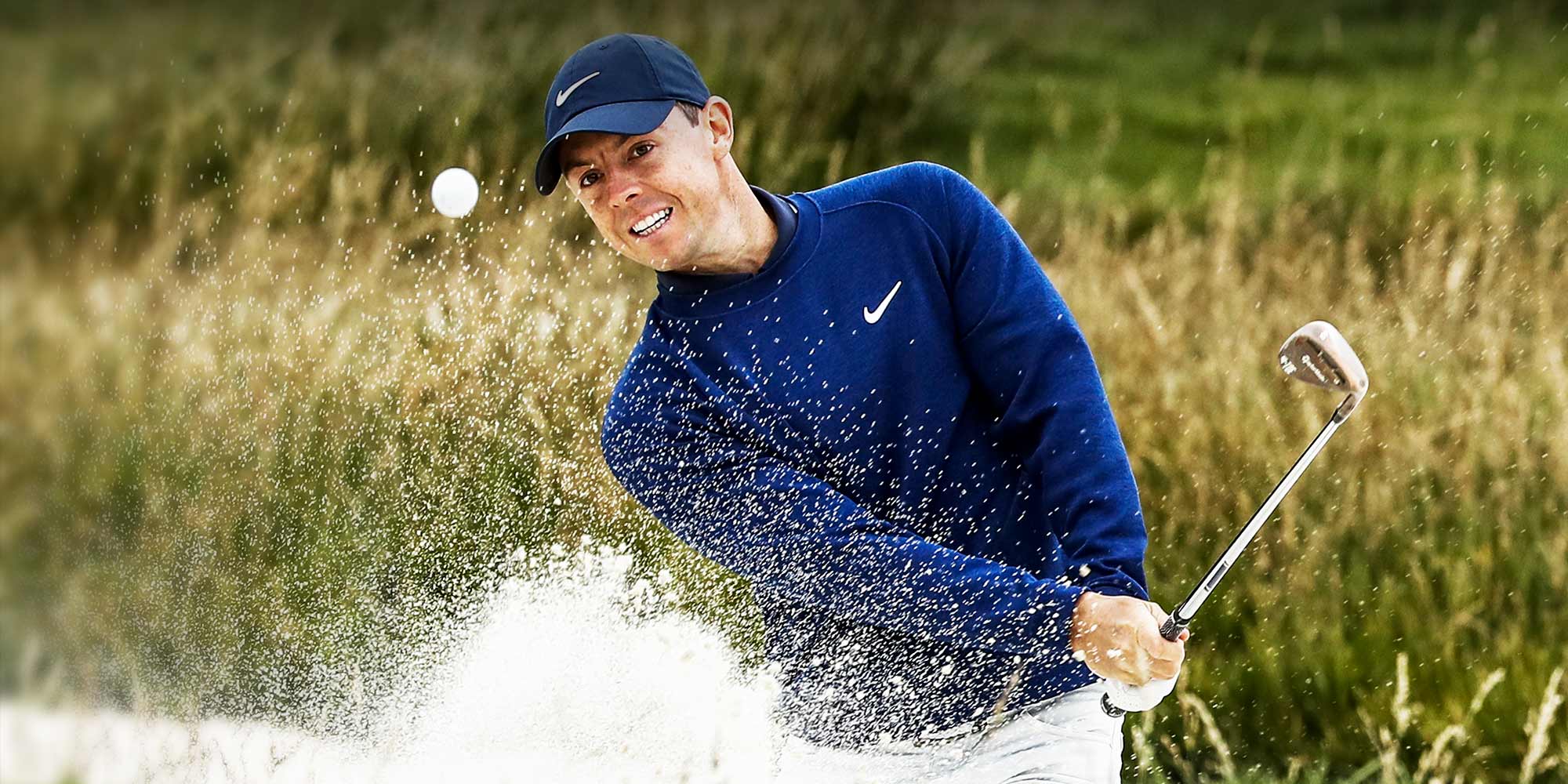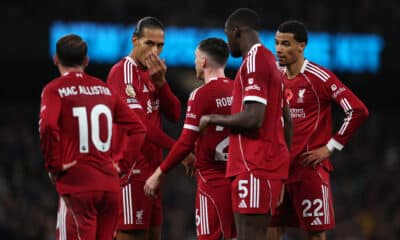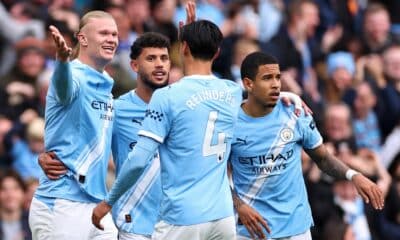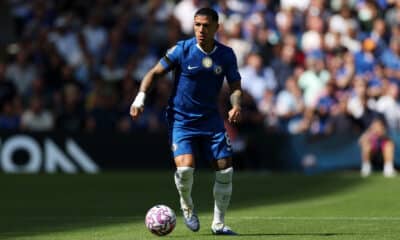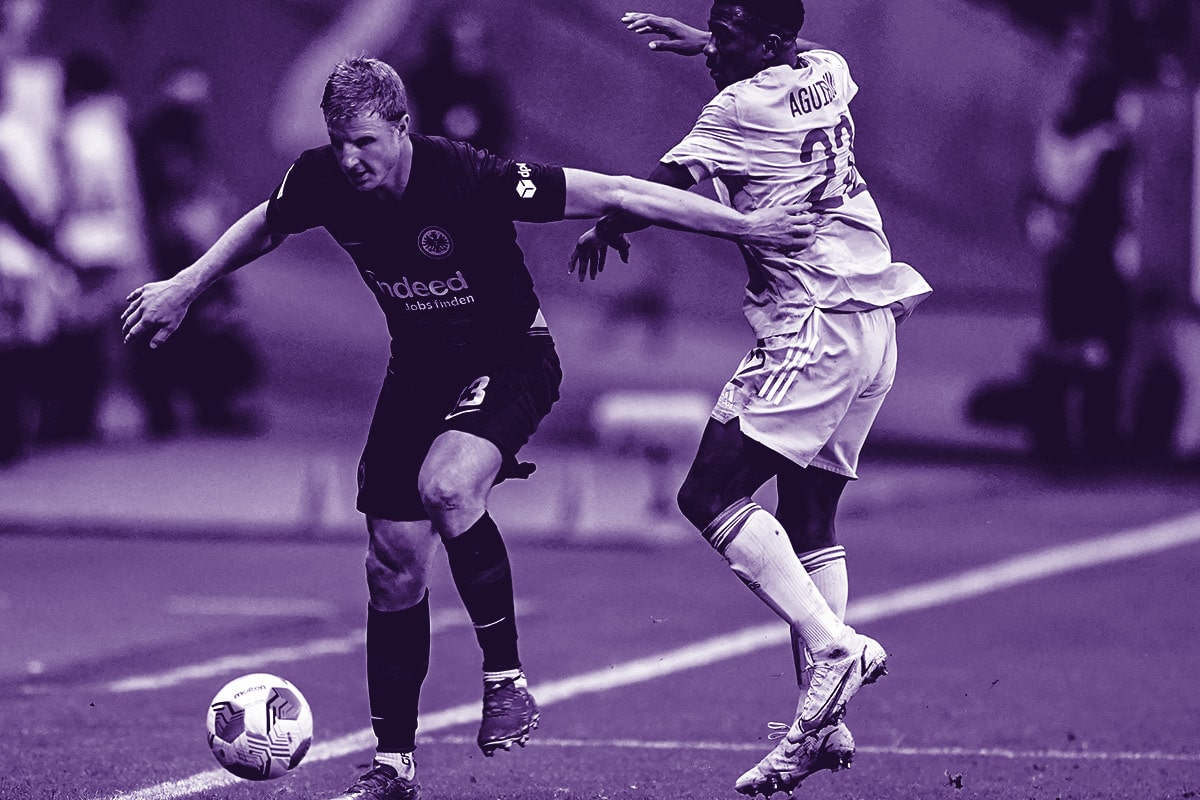
For the first time since 1959/60, Eintracht Frankfurt will be playing in Europe’s premier football club competition next season as they enter the 2022/23 UEFA Champions League group stage after defeating Rangers 5-4 on penalties after drawing 1-1 in extra time in the UEFA Europa League Final in Seville. The fifth season of the European Cup saw Eintracht defeat Swiss side Young Boys 5-2, Austrian side Wiener Sportclub 3-2, and thrash Rangers 6-1 in the first leg of the semifinals before winning 6-3 at Ibrox to become the first German side to reach a European final. Eintracht took the lead within 18 minutes at Hampden Park via Richard Kress, but a first-half brace from Alfredo Di Stéfano saw Los Blancos go into halftime on top, before winning 7-3 via four goals from Ferenc Puskás within the first 26 minutes of the restart as well as another Di Stéfano goal, Eintracht only making the scoreline somewhat bearable via a brace from Erwin Stein.
Frankfurt in Europe
Die Adler returned to a European final 20 years later when they faced off against Borussia Mönchengladbach in the UEFA Cup Final – Gladbach won the first leg 3-2 at home, but an 81st-minute goal from Fred Schaub would see Eintracht prevail on away goals for their first-ever intercontinental triumph. Over the next three decades, however, the closest Eintracht came to reaching another final was in 2018/19 when they topped their Europa League group of Marseille, Lazio and Apollon Limassol before eliminating Shakhtar Donetsk, Inter and Benfica and facing off against Maurizio Sarri’s Chelsea in the semifinals. Having drawn 1-1 in Germany via first half-goals from Luka Jović and Pedro Rodríguez, Ruben Loftus-Cheek and Jović’s goals in the second leg would see them head to penalties; an early miss from César Azpilicueta saw Eintracht go 3-1 up before misses from Martin Hinteregger and Gonçalo Paciência saw Chelsea go through to the final, where they would defeat Arsenal 4-1 in Baku.
Bundesliga Managerial Merry-Go-Round
After losing Ante Rebić, Sébastien Haller and Luka Jović, who made up Adi Hütter’s fearsome attacking trident, Eintracht took a step back in 2019/20, missing out on European football entirely, but they were nevertheless able to bounce back the following season and finish fifth, their highest finish since 1992/93. However, the summer of 2021 would see Hütter end a fruitful three-year spell as Eintracht manager and replace Marco Rose as Gladbach manager, where he would last just one season before departing the club after finishing 10th in the Bundesliga, three points above Eintracht and Wolfsburg, both of whom were dealing with new managers after a hectic summer in Germany: Hansi Flick replaced Joachim Löw as Germany manager, Julian Nagelsmann replaced Flick as Bayern Munich manager, and Jesse Marsch replaced Nagelsmann as RB Leipzig manager before being replaced in December by Domenico Tedesco. Mark van Bommel’s stay as Wolfsburg manager came to an end in October after eight winless games in all competitions before being replaced by Florian Kohfeldt, who was replaced by Niko Kovač at the end of the 2021/22 campaign. The announcement of Marco Rose as BVB’s upcoming manager midway through the 2020/21 campaign helped derail Gladbach’s campaign, but Rose, like Hütter, would be sacked after one year and replaced by Edin Terzić, ironically, the same ex-interim coach who was replaced by Rose a year ago.
Two of the only beneficiaries from the Bundesliga’s managerial merry-go-round were Bayer Leverkusen and Cologne. Leverkusen returned to the Champions League after a three-year absence under new manager Gerardo Seoane, who guided them to a third-place finish, whilst Steffen Baumgart ended a four-year spell at Paderborn to become Cologne’s new manager before leading them to a seventh-place finish and European qualification. Whilst Eintracht Frankfurt struggled domestically under new manager Oliver Glasner, finishing 11th and losing to third-tier SV Waldhof Mannheim in the First Round of the DFB-Pokal, they have nevertheless given their fans some lifelong memories with a historic European campaign.
Eintracht’s 2021/22 Europa League Campaign
Having lost to Basel in the 2019/20 Round of 16, Eintracht were eager to one-up their last Europa League participation and managed to start off well as three wins and three draws saw them top their group of Antwerp, Fenerbahçe and Olympiakos. They would win the first leg of their Round of 16 tie vs Real Betis 2-1 and looked set to progress before Borja Iglesias send it to extra time after scoring in the 90th minute – Betis would get a taste of their own medicine, however, as an own goal from Guido Rodríguez in the 120th minute saw Eintracht snatch a last-gasp victory at home. Having drawn 1-1 in the first leg at home despite playing down a man for 12 minutes, Eintracht fans invaded Barcelona for the return leg where the German side did the unthinkable: Filip Kostić put them ahead from the spot within 4 minutes, Rafael Santos Borré added another before halftime and Kostić stretched the lead to three in what would end up being a 4-3 win on aggregate.
They would grab an even earlier lead the following match as Dortmund loanee Angsar Knauff put them ahead within a minute after finishing off a Borré cross, with Michail Antonio tying things up 20 minutes later and Daichi Kamada putting the visitors ahead after the break. Following a 2-2 draw at home against Hoffenheim, Eintracht hosted West Ham in the second leg, suffering a hammer blow early on when Austrian centre back Martin Hinteregger was withdrawn after eight minutes with a hamstring problem. 11 minutes later, the Hammers shot themselves in the foot as Aaron Cresswell dragged down Jens Petter Hauge and received his marching orders. Borré stretched Eintracht’s aggregate lead to two goals shortly after, a lead that they would not relinquish. The Colombian forward would even things up in the final after Joe Aribo’s opener, forcing a penalty shootout: Eintracht would win 5-4 as a miss from Aaron Ramsey proved fatal in Rangers’ Europa hopes, giving Die Adler their first European trophy since 1980.
“Some teams are better suited to being cup teams and some league teams,” says Bundesliga journalist Ronan Murphy. “See Pep Guardiola’s Manchester City for example, they just haven’t been able to get over the line in the Champions League but have won 4 of the last 5 Premier Leagues. Eintracht this season was the opposite – they never could find consistency in the league but had the killer instinct they needed in Europe, and then towards the end of the season, they just gave up on the league altogether to focus on the Europa League.”
“Glasner has the right approach and it should pay dividends in the long run in the Bundesliga. It already has in Europe, and Champions League qualification is huge cause it’ll help him have a better and deeper squad this coming season. Eagles fans will be happy enough to write off last season’s league performance as it’s irrelevant now.”
Their Transfer Window So Far
Since that penalty shootout on May 18, Eintracht have been busy at work in the transfer market, bringing in Croatian center-back Hrvoje Smolcic from Rijeka as well as World Cup winner Mario Gotze from PSV and Argentine striker Lucas Alario from Bayer Leverkusen, whilst also making their deals for Milan’s Jens Petter Hauge and Dinamo Zagreb’s Kristijan Jakic. A total of five players have arrived on free transfers including Cameroonian defender Jerome Onguene, Portuguese right-back Aurelio Buta, and French centre forward Randal Kolo Muani. Eintracht CEO Markus Krösche has been heavily involved with Glasner as they prepare for their first-ever Champions League campaign in club history as well as a date with Real Madrid in the UEFA SuperCup on August 10 in Helsinki.
After beating Real Betis and Barcelona, they now have a chance to make it a third victory over a Spanish team in a year. The same travelling hordes of fans that took over Barcelona for a day will now make the trip to Finland’s capital and embark on a once-in-a-lifetime occasion and kick off the 2022/23 season with a historic victory, where they’ll be looking to follow the example of Atlético Madrid from four years ago, who defeated Los Blancos in the SuperCup, becoming the latest of eight UEFA Cup / Europa League winners to prevail against the Champions League winners in since the UEFA Cup Winners’ Cup was discontinued in 1999. Just about everyone associated with Eintracht Frankfurt will be there – everyone except Martin Hinteregger.
Martin Hinteregger’s Retirement
After spending a decade at Red Bull Salzburg, a 23-year-old Hinteregger headed out on loan to Gladbach in January 2016 but made just 10 league appearances as Die Fohlen elected not to make the deal permanent. He returned to Salzburg in the summer and made 11 appearances between July and August before moving to Augsburg on deadline day on a 2-year contract, quickly becoming a regular in defence for the Bundesliga side and scoring 3 goals in 31 games in 2016/17.
Augsburg finished midtable in Hinteregger’s first two seasons but fell into a relegation battle in the 2018/19 season, and after a 2-0 defeat to Borussia Mönchengladbach on January 26, Hinteregger lamented, “I can’t say anything positive about and I won’t say anything negative,” leading the club to give him a hefty fine, suspended him from training and told him to find another club. Hinteregger joined Eintracht Frankfurt on loan on deadline day and quickly became a force in defence under Adi Hütter, who had replaced Niko Kovač the prior summer following the latter’s move to Bayern Munich, starting the first three matches and snatching three draws against Dortmund, Leipzig and Gladbach before winning six straight in the league.
Two weeks after joining Eintracht, Hinteregger got his first taste of European action for a German side and scored a goal in a 2-2 draw vs Shakhtar; he would play every minute of every knockout match apart from the second leg vs. Benfica, as Eintracht advanced to the semifinals before losing to Chelsea courtesy of misses from Hinteregger and Paciência in the penalty shootout. A heartbreaking end to an unforgettable campaign, but one that did not dissuade Eintracht from signing Hinteregger on a permanent deal for €9 million.
“He’s a very consistently inconsistent player. He’s great 95% of the time, you just have to hope the other 5% of the time is when Frankfurt are attacking and not defending,” says Murphy. “He can look brilliant but also be prone to a mistake that ruins the previous 89 minutes. His personality breeds popularity..he’s popular with fans and teammates, he’s ambitious and driven and encourages those around him to be the same.”
The 2019/20 season would see Hinteregger emerge as one of the top-scoring center-backs in Europe with 9 goals and 3 assists in 48 appearances across all competitions as Eintracht took a step back in form, finishing 9th (7th in 2018/19) to miss out on Europe entirely, losing 4-0 to Basel in the Europa League Round of 32, and losing 2-1 to Bayern Munich in the DFB=Pokal semifinal. Hinteregger missed a month of action with a thigh problem but nevertheless racked up 2 goals and 3 assists in 31 matches in 2020/21 as Eintracht finished fifth in the league, whilst also starting each of Austria’s four matches in the Euros where they would lose to eventual champions Italy in extra time in the Round of 16.
Hinteregger began the 2021/22 campaign with a 5-2 defeat at Borussia Dortmund before wearing the captain’s armband for the first time in his Eintracht career and starting the next five matches – all of which were draws – before scoring in a 2-1 win vs. Bayern Munich, his lone goal of the season. The Austrian remained a key pillar in defence under new manager Oliver Glasner, often wearing the armband and steadying the ship in a transitional year, but he was unable to secure qualification to his first-ever World Cup and end a 24-year drought as a brace from Gareth Bale saw Wales progress to the playoff final and defeat Ukraine to book their ticket to a first World Cup in 64 years.
After missing the first match out of the international break due to yellow card suspension, Hinteregger started Eintracht’s next seven but was withdrawn within eight minutes in the second leg against West Ham, with the same recurring thigh injury that has plagued him throughout his career once again popping up. Hinteregger would miss the last two league matches, two draws to Gladbach and Mainz, as well as the Europa League Final, as Eintracht Frankfurt defeated Rangers on penalties to cap off an unbeaten European run and become one of the few teams in history to qualify for the UEFA Champions League despite finishing in the bottom half of the league table in 11th place. As Eintracht’s booming fanbase celebrated their epic victory in Andalusia, few could have imagined that just a month later, they’d be forced to say goodbye to one of the most important players in the club’s recent success.
At the age of 29, Martin Hinteregger retired from professional football, putting an end to a career that has seen him reach 19th amongst Austria’s all-time appearance makers with 67 caps as well as 64th on Eintracht Frankfurt’s list with 136. Danny da Costa, who sits 71st with 128, has also departed the club and joined Mainz on a free transfer.
Hinteregger had a year remaining on his contract, but he has chosen to walk away from the sport just two weeks after his links to a far-right politician in Austria emerged. He organized a youth tournament, the Hinti Cup, in his hometown of Sirnitz with former business partner and fellow Sirnitz native Heinrick Sickl. As a youngster, Sickl was a member of the German neo-Nazi organization Nationalist Front until it was banned as unconstitutional in 1992, and he also held a position on the Graz City Council for the nationalist Freedom Party of Austria (FPÖ) until 2021 in which he rented premises to the far-right party “Identitarian Movement Austria.” The symbols of the Identitarians have been banned in Austria since last year with the government describing the organization as “right-wing extremist, racist, sexist, nationalist and ethnically oriented.” Once Hinteregger’s links to Sickl emerged, with the tournament set to be held at an estate owned by Sickl’s mother, the Austrian defender was forced to take to social media to defend himself amid a shower of criticism:
“Like the Sickl family, I am rooted in Sirnitz — I wanted to show my appreciation and say thank you to the fans, patrons and supporters from my childhood with the Hinti Cup. I have no knowledge of past or future activities on the part of the Sickl family — I just want a soccer tournament to take place and nothing more. Any business relationship with the Sickl family will be terminated with immediate effect due to the current state of knowledge, and the Hinti Cup will be examined alternatively to clarify a further course of action. I have friends all over the world through my time in professional soccer and also privately, and clearly reject accusations that I am right-wing oriented, and continue to stand up against any kind of discrimination.”
However, Hinteregger made it clear that the reason he was retiring was not due to a scandal involving a right-wing politician, but instead, his personal concerns over his form and fitness. “Last autumn, I’d already started to think about retiring at the end of the season. I was in a difficult period on the pitch: my performances were shaky. The wins didn’t feel as good anymore, and every defeat hurt twice as much. My improvement in the spring and our joint successes in the Europa League made me even more motivated to bow out with great sporting success.”
“That’s why I enjoyed the Europa League victory so much because I already knew it would be my last big victory celebration with the fantastic fans in this city, which has become my second home. “I will think back on my time with Eintracht with only great gratitude and joy, continue to feel closely connected to the club and their fans, and support the team as a fan on their continued journey in Europe. “I thank my teammates, the coaching staff, the backroom staff, all the employees and the sporting management for the faith, the support and the wonderful time I’ve experienced here. Above all, I thank the fans, who have always been behind me, including and especially in difficult times.”
Hinteregger has been open about his mental health struggles and discussed his issues with depression in his recently published autobiography, and it appears that the negative reaction to the Hinti Cup may have played a role in forcing Hinteregger to step out of the spotlight and end an incredibly successful chapter in his career. “In the past few weeks, a number of issues have arisen around my Hinti Cup, which I have run with passion and the best intentions, the implications of which have only become clear to me in retrospect. Some emotional and perhaps ill-advised words from me have caused irritation and I would like to apologise for that. I regret that very much. To make it clear once again: I condemn right-wing, intolerant and inhuman ideas in the strongest possible terms. Those who know me know that. For now, I need to get some distance and readjust my life. I’m grateful that Eintracht have given me the opportunity to take this step now.”



